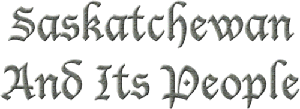PERSONAL KNOWLEDGE OF THE EARLY EUROPEAN IMMIGRANT.
THE FINNS. {con't}
wife and children disappeared into the bunks, leaving Lantilaus alone in
view. He went into the vacant room and brought out what looked like a
rickety coffin on stilts. This he stood in the middle of the room and began
to put bedding in it. I realized this was to be my couch. When all was
ready my whiskered and husky host for some reason which I could only
guess at, held up a tin bucket and drew my attention to it with a smile
which made all his fine teeth gleam through his whiskers. Then he, too,
disappeared in the bunk region; and I was left to take possession of my
isolated bed, which I thought it only polite to do with my trousers on.
There had been no light in the room except that from the fire, so there
was no lamp to put out. Lying in my improvised bed, which was com-
fortable enough to a hard working man my thoughts were not very pleas-
ant. I looked at that cavernous chimney the top of which led out into the
wide world and at least forty below zero. The hot coals looked very pleas-
ant but they could not last long; the bitter cold would come whooping
down that chimney and I should certainly be a very, a very chilly mortal
before long. Before I knew it I was asleep. When I woke the people were
moving about before daylight and the house was beautifully warm. The
next night brought a similar experience. How the house was kept warm
puzzled me, and then, like Mrs. Lakki's camp, the secret divulged itself. I
noticed that there was a piece of tin sticking out of a slit in the side of
the chimney. When the half-burned wood had been removed so that there
could be no smoke the boy slid this piece of tin into the chimney and shut
off the draft. The massive mud and stone chimney retained a great body
of heat in itself, which the hot embers conserved; and so the house was
quite comfortable all night.
One other little incident at Lantilaus' and I shall be pretty nearly
through with my good hosts the Finns. I have mentioned the lack of
reading matter and the god-send of the Massey Harris Magazines. One
evening I noticed Lantilaus' little girl coming to me with a little paper
covered book. Here was something to read at last. So it was. It was the
third Ontario reader.
One other place I stayed at with my old man-killer was that of a newly
married couple, in a newly erected little log house. Whatever they may
be now the foreign settler of that day had, as a rule, a steady and invin-
cible objection to fresh air. Ventilation in the house was anathema. One
night the little house of the newlywedded ones was oppressively hot from
the big cook stove. I thought I would surreptitiously let in a little air.
The door closed, not with a lock but a wooden latch. I went out for a last
look at the weather before turning in, shut the door and then softly lifted
the latch and left the door open a couple of inches. I hadn't got three
feet away from the door before click it went. The eagle eyes or keen
noses of the occupants had instantly noticed that fresh air was coming
in, and so click went the latch. In bidding the Finns adieu I wish to say
that I put him first of all the European immigrants. For hardiness, in-
dustry, resourcefulness, and all 'round competency in meeting pioneer
conditions and cleaning up a rough country, rightly or wrongly, I put the
Lutheran Finn easily first. I take off my hat to him today in remembrance
of what I found him to be thirty years ago. It occurs to me to add that I
haven't the slightest recollection of the food the Finns gave me, so it must
have been alright. Of one thing I am more than certain, and it is that
these kind and hospitable women from the borders of Lapland gave me
the best they had.
Bibliography follows:

